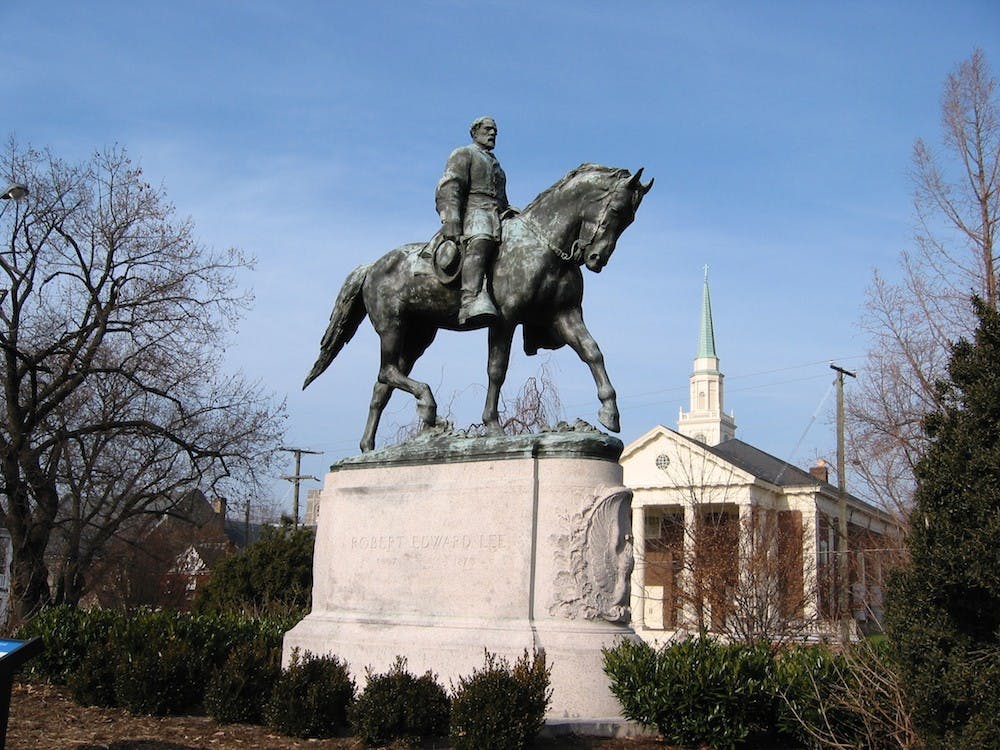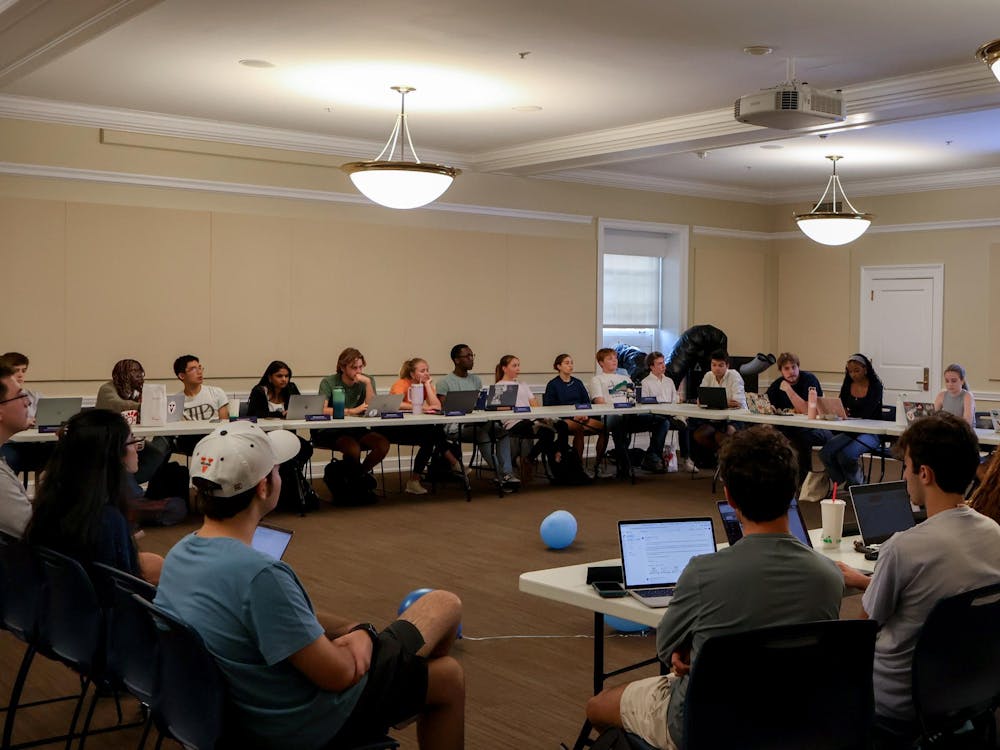With the Aug. 12 “Unite the Right” rally only a few days away, conflict has risen between the City of Charlottesville and the rally’s organizer over where the event can legally be held. The American Civil Liberties Union Foundation of Virginia and The Rutherford Institute became involved Tuesday after sending a letter addressing the issue to members of the Charlottesville City Council and the city manager.
The organizations are now actively planning to file a lawsuit against the city.
The dispute began Monday when City Manager Maurice Jones announced in a press conference that the permit application filed on May 30 by Jason Kessler, the organizer of the rally and a pro-white activist, would be approved only if the demonstration was held in McIntire Park. Kessler applied to hold the event — which, according to its Facebook page, “seeks to unify the right-wing against a totalitarian communist crackdown” — in Emancipation Park, formerly named Lee Park.
Numerous white nationalist “alt-right” activists are expected to attend the rally, including University alumnus Richard Spencer.
“The City has serious concerns about ensuring the safety of the expected demonstrators in Emancipation Park, expected counter-demonstrators and the public and to protect against public and private property damage, among other concerns,” Jones said.
Charlottesville City Police Chief Al Thomas said holding the rally in McIntire Park is safer because it is larger, allowing the police department to implement necessary security precautions and providing a space that will accommodate an anticipated large crowd.
“It also avoids a situation whereby overflow crowds spill into the streets, as would likely occur at Emancipation Park,” Thomas said. “Law enforcement also will have the room needed to maneuver and direct crowds toward safety in case of a disturbance.”
Following the press conference, Kessler tweeted that the rally would still be held in Emancipation Park. He also tweeted a video expressing his displeasure with the city’s decision.
“They want to move it to McIntire Park, this area that’s across the way that doesn’t have a damn thing to do with the Robert E. Lee monument,” Kessler said. “That is the first and foremost reason that we’re having this rally is for that park and for that statue.”
The rally is being held in protest of City Council’s decision earlier this year to remove the statue of Robert E. Lee from Emancipation Park.
The ACLU of Virginia and the Rutherford Institute agreed the city’s decision violated the First Amendment and sent a letter Tuesday expressing their concerns to Jones and members of City Council.
“Both the timing and justification for the demand that organizers accept a move to McIntire Park show a callous disrespect for the rights of free speech and assembly, forcing an eleventh-hour relocation of the rally from the place chosen specifically because of its importance to the message of the rally organizers,” the letter said.
The letter said the city’s justification for moving the rally is questionable.
According to section 3.4.7 of the Special Events Regulation, the permit can only be revoked if the event “presents a danger to public safety” or “cannot be reasonably accommodated in the particular area applied for.”
The organizations say the city is expecting “many thousands” to attend the demonstration, but have not provided the factual evidence to support their estimate.
The letter reminds the city that opposition to the group is not a justifiable basis to “suppress the First Amendment rights of demonstrators” and they must follow the law, even if it is “distasteful … to members of the community.”
They also condemn the city’s timing in making this decision, stating the announcement “appears to be an attempt to undermine the ability of demonstrators to effectively communicate their message.”
The ACLU of Virginia and The Rutherford Institute requested a response from the city by Wednesday at noon.
City Attorney Craig Brown responded Wednesday, stating the decision was not made due to opposition to the content of the rally’s message and questioning whether the ACLU of Virginia or The Rutherford Institute is representing Kessler.
“The City Manager based his decision on substantial interests that are totally unrelated to whatever message that Mr. Kessler and his associates will be delivering,” Brown wrote. “Please consider the fact that last month the City and its employees made significant sacrifices to ensure that the Loyal White Knights of the Ku Klux Klan could hold a rally.”
Claire Gastanaga, executive director of the ACLU of Virginia, confirmed Wednesday afternoon in a response to Brown that Kessler is a client of the organization and will be co-counseled by The Rutherford Institute’s President John Whitehead and his associate, Doug McKusick.
In a phone interview with The Cavalier Daily Wednesday afternoon, Whitehead said the organizations are preparing a complaint to file a lawsuit with hopes of filing it by Thursday.
“Their response says that basically their resources, the money they had to spend, are essentially the reason they denied the permit,” Whitehead said. “You can’t do that under the First Amendment, not under permit regulations.”
The Charlottesville Police Department previously spent a total of $32,835 on personnel and supplies for the July 8 KKK rally.
City spokesperson Miriam Dickler said in a phone interview with The Cavalier Daily that the legality of holding the rally in Emancipation Park is dependent upon the outcome of the impending lawsuit, and the city is preparing to keep the community safe regardless of the demonstration’s location.
“The police and the city are preparing for multiple possibilities,” Dickler said. “We do expect that people may go downtown, [and] we do expect that people may go to McIntire Park, so at this point, we’re planning for either eventuality.”
In an email to the University community, President Teresa Sullivan encouraged students and community members to avoid the rally and any physical confrontation.
“There is a credible risk of violence at this event, and your safety is my foremost concern,” Sullivan wrote. “Moreover, to approach the rally and confront the activists would only satisfy their craving for spectacle. They believe that your counter-protest helps their cause.”
Sullivan’s email detailed a number of University-sponsored events that will be held around Grounds, including a series of discussions held by University and Charlottesville community members intended to foster an environment of mutual respect and inclusion.
Law Prof. Douglas Laycock, who will be leading a discussion titled “Freedom of Speech and Assembly: What’s Protected and What’s Not,” said in an email to The Cavalier Daily that extreme and hateful messages and assemblies are protected until demonstrations are deemed dangerous to public safety, using the crowd size of the July 8 KKK rally as an example.
Laycock is an expert on the law of religious liberties and on the law of remedies. He is also Sullivan’s husband.
“One of the reported problems at the Klan rally in July was that when the counterprotestors were ordered to disperse, they couldn’t,” Laycock said. “The crowd was too dense and at least the people at the front had nowhere to go. And quite possibly the people at the back didn’t hear the order and weren’t getting out of the way.”
“There are credible reports that innocent people were gassed because it was too crowded,” Laycock said. “That’s the kind of problem the city and the police are trying to prevent.”







